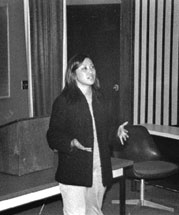

People usually don't want to think about where their clothes come from. They don't want to think about where their clothes were before they hung on the rack at the mall. Wednesday, Kim Myoshi told her audience why.

Myoshi, corporate accountability director at Global Exchange, spoke in King Wednesday on the topic of "Corporate Accountability in Nike."
Global Exchange is a non-profit organization dedicated to human rights and is funded 75 percent by individual donations. One of its latest campaigns, part of the Corporate Accountability program, is to de-sweatshop the Nike corporation.
"The program tries to convince national companies to improve conditions and grant living wages in their companies overseas," according to Myoshi's biography.
According to Myoshi, Indonesian workers make $2.46 a day, Vietnamese workers make $1.60 a day and Chinese workers $1.51 a day.
"One 15-year-old girl I talked to said she worked about 100 hours of overtime a month," Myoshi said.
In addition to eliminating the long hours of work for little pay, Corporate Accountability also wants the same working conditions for people overseas as workers receive here. Myoshi said in Indonesia, 77 percent of the workers in Nike sweatshops have respiratory problems due to working around toxic chemicals. Nike is also violating 12 labor laws in China, Myoshi said.
Myoshi also spoke on the hypocrisy of Nike's image. "It is a company that prides itself on women empowerment," Myoshi said. "I have two sisters who play basketball; however, I'm not going to divorce the protection of women's rights in this country and the protection of women's rights in Third World countries because the women in this country can buy shoes. Otherwise you're just prostituting the mes sage to make higher sales."
Myoshi said the goals Global Exchange is working toward are realistic ones.
"These are very simple things that we ask for," Myoshi said on the subject of human rights. "We just want them to extend them over to Asia, to the 450,000 women who make their shoes."
After talking to workers, Myoshi said, she discovered that their biggest concern was wages. Global Exchange helped convince Nike to raise their wages to at least the minimum.
Myoshi got involved in Global Exchange as a direct result of a job teaching inner city middle school kids. All she heard from her students was that their goal was to be able to wear Nike, Tommy Hilfiger and Adidas gear. This, they told her, would be proof that they were lifted from the ghetto.
Myoshi wanted to investigate. "Why is their gear an accurate measure of self worth?" she asked.
In finding out about Nike, Myoshi discovered Global Exchange and studied in Japan. She then decided she wanted to join.
Myoshi will move on to Boston as she enters the fourth day in her 20 day tour promoting corporate accountability.
"If the situation looks out of control, you have to exert what control you do have and as a consumer who spends a lot of consumer dollars, you have some power," she said.
The Student Labor Action Coalition (SLAC) and the Oberlin College Democrats, who sponsored this event, are in the process of de-sweatshopping Oberlin. They are petitioning to the College not to buy from groups who manufacture their clothes in sweatshops.
In response to an audience member's question as to whether the signing of this petition would put people out of work, Myoshi answered, "The good thing about the student codes of conduct from different universities is that all they say is, 'we ask from all the people that serve our lisencee, anybody that we contract with, that you can't be producing goods under sweatshop conditions.' It's a way that your school can pressure companies into changing the way they do business."
Just doing it: Kim Myoshi spoke Wednesday on the importance of enforcing fair labor practices for Nike workers. (photo by Zach Fried)
Copyright © 1998, The Oberlin Review.
Volume 126, Number 22, April 24, 1998
Contact us with your comments and suggestions.